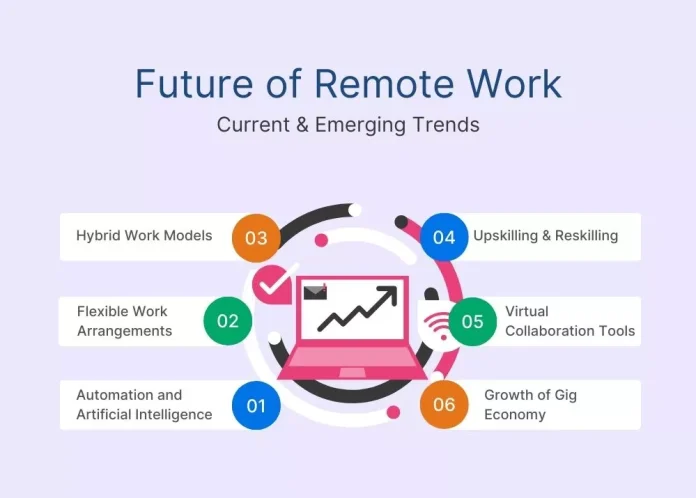During these days work from home has become an essential part in people’s lives. They do their work according to them and the COVID 19 gave it a push and it gained even more popularity during the crisis. Fpr sa few companies, work from home is a piece of cake but for some, it is really hard to manage the online working environment. So we are gonna be talking about remote work’ pros and cons of remote work in one’s life.
Going in 2025
As the year ends and there are several changes made throughout the year, one being realising the importance of work from home. After COVID, it has been a really great initiative as it saves them as well as their employees cost, time and energy. It brings benefits for both the parties and it is good for the company to adapt this because it has become a part of the modern workplace and even the employees appreciate it.
Also read : Remote Work Has Changed Communication
Rising jobs
Work from home does not just give someone an opportunity to work, it also helps students to do their internship while studying in college. The tech sector has been one step forward in this, they offer a variety of jobs online which can be done by home. In the US, 30% of the people could be completely disconnected from typical office locations within a decade.
Employers appreciate the companies
Companies who were previously hesitant to surrender control of in-person operations now see the benefits of remote work as a competitive advantage in the chase for global talents. Companies like Google, Apple and Slack have taken the initiative and offer a wide variety of remote jobs through their website’s listing. Even the employers look for companies which are ready to give work from home because it is more convenient for them to do so.
Role of Technology
Technology has made it very easy for companies to get connected with apps such as Zoom, google meet, and many more. Not just the company, but it also helped schools and colleges. Having meetings online through these apps made it very suitable for the employees since they don’t have much to do and the workload is balanced. Ai is also a part of this and it helped in establishing great communication and managing remote employees with almost simple clarity. There are apps such as Kumospace, in which there is a virtual workspace and it is decorated with various things such as plants, toys, and a variety of furniture, this creates a bond between the employees and makes work ten times better to do without getting bored.
Having a strong work-life balance
Many struggle to keep up with their work and are not able to focus on their personal lives because of all the work pressure and load. Working from home gives an opportunity to people to be with their loved ones even while working and they save so much time, energy, and money on traveling. Remote jobs have gained so much popularity that employees are ready to take a lower salary if the company offers work-from-home opportunities. Work from home gives more than just a new way of working, it also provides a new lifestyle, demonstrating that the benefits go far beyond the office setting. Remote working has transformed how we approach our everyday life and job goals.
Challenges faced by the Remote Employees
The challenges persist even if one does not go to office. Being always on screen, connected with technology makes it hard for them to get disconnected and look after themselves. They end up spending hours on their laptops or mobiles which disconnects them from their personal life. The employees also feel a sense of burnout, mainly for the ones working in sales and development. Burnout and stress must be handled by closely monitoring extended work hours and the isolation that can result from a lack of traditional workplace support networks.
Economic Impact
Working from home helps in saving small expenses such as traveling and it also increases productivity. Employees save money on transportation and other work-related expenses when they work remotely. For Employers, their costs have been reduced as they have smaller office areas, as well as lower power and supply prices. Employers who embrace remote work can save an average of $11,000 per year per employee on the costs of maintaining physical office locations. At the same time, employees’ daily expenses are decreasing, lowering the need for higher salaries and leading to a more satisfied workplace.
Conclusion
Remote work is redefining the modern workplace, allowing flexibility, cost savings, and new opportunities for enterprises and individuals alike. On the one hand, remote work impacts the ability to work remotely and has many benefits, including better work-life balance, productivity, and cost savings. If we utilize technology, create supportive virtual environments, and address these issues, remote work can flourish as the base of the workplace of the future. For businesses and individuals navigating this new normal, remote work is not just a shift in professional life, it is a lifestyle shift that mirrors the priorities of a connected society adapting to global challenges.
Also read : How to Create a Remote Work-Life Balance
FAQ
- What are the primary benefits of remote work?
Remote work offers flexibility, reduced commuting time, cost savings for both employers and employees.
- How has technology contributed to remote work?
Technology enables seamless communication and collaboration through platforms like Zoom, Google Meet, and virtual workspace apps like Kumospace, ensuring efficient operations in a remote setup.
- What are some challenges of working remotely?
Challenges include feelings of isolation, maintaining a work-life balance, burnout due to extended screen time, and lack of traditional workplace interactions.








